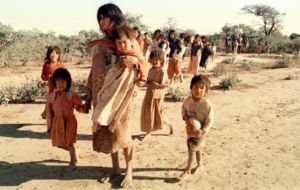MercoPress. South Atlantic News Agency
Argentine church says child malnutrition stats manipulated; blames corruption and indifference
 “Nowadays Indec numbers are under suspicion: inflation, poverty, but beyond statistics there are real stories of families and communities”, said Lozano
“Nowadays Indec numbers are under suspicion: inflation, poverty, but beyond statistics there are real stories of families and communities”, said Lozano  Mud huts, straw roofs, skinny dogs, thin pregnant mother, plus no drinking water or sewages, is where most probably you will find malnutrition cases
Mud huts, straw roofs, skinny dogs, thin pregnant mother, plus no drinking water or sewages, is where most probably you will find malnutrition cases Argentina's Catholic church warned that the official data on child malnutrition is 'manipulated' to avoid responsibility and rejected the official government argument that the death of some children because of nutrition problems are 'isolated cases'. The statement follows the surfacing of children's deaths of aborigines communities in northern Argentina.
The head of Argentina's Episcopal Commission on Social affairs Monsignor Jorge Lozano attributed the cover up of this “very hard situation” on children's malnutrition to authorities, both at provincial and federal level, 'indifference' and 'corruption'.
”Nowadays numbers of Indec (Argentina's official stats office) are under suspicion: inflation, poverty, but beyond statistics there are real stories of families and communities. Hiding the situation is temporary, and they certainly do not modify the real situation“, said Monsignor Lozano.
”To find malnutrition you must know and want to look for it: mud huts with plain earth floors, mud walls, straw roofs, skinny dogs in the yard, pregnant mother, thin and clearly with no medical attention. Plus there is no running drinking water or sewages. At such places it is most probably you will find malnutrition cases“, added the Catholic Church bishop.
”This can also be clearly detected in the precarious settlements in suburbs of big and medium cities, in housing made out of card-box and nylon, with rats all over the place“.
Monsignor Lozano pointed out that even when in the last few years Argentina experienced strong economic growth, ”there are still cores of poverty which have not been reached or addressed, as I mentioned in reference to shanty towns in cities and communities in rural areas“.
But the same way that we have hard core poverty, we also have hard core wealthy groups which have become even more rich and have concentrated all kinds of assets. ”To reach the periphery you must be on the beat, walk the streets and thus avoid two evils of our time: globalization of indifference and corruption“.
Monsignor Lozano also underlined that the aborigine communities are marginalized from social support for various reasons, among which they have not been able to legalize their plots of land; they are distant from networks and do not have the infrastructure that means access to healthcare, drinking water and sufficient food.
”There are also cultural issues which determine conduct, and are important and to be taken into account. In effect most healthcare and social assistants are 'white' and dialogue is difficult to have a complete perception of the situation”, concluded the bishop.




Top Comments
Disclaimer & comment rules-

-

-

Read all commentsI think the hardest thing for most people from the USA to see is the poverty of the 3rd World.
Feb 12th, 2015 - 09:51 pm 0Most of us have no idea how bad it is in the rest of the world.
This is particularly shameful when they have such an abundance of food in Argentina.
The Rgs like to pretend it doesn't exist.
The worst I've ever seen anywhere is the filthy shoeless kids begging in Misiones.
A memory burned in my mind that I can never unsee.
Says it all basically
Feb 12th, 2015 - 10:51 pm 0http://missionjusticeargentina.blogspot.co.uk/2010/07/indigenous-peoples-of-argentina.html
Don’t read this 4th class newspaper
Feb 12th, 2015 - 11:51 pm 0According to INDEC latest figures the Native children doing diet in Chaco and Formosa have risen 40% after watching Disney Channel and buying imperialist Barbie dolls.
Commenting for this story is now closed.
If you have a Facebook account, become a fan and comment on our Facebook Page!